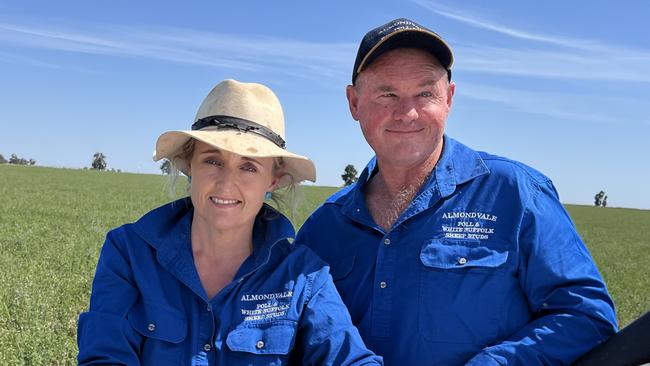Almondvale: Routley family perfects wool and lamb enterprise
The Routley family shares knowledge from one generation to the next in their sheep enterprise. See the recipe that works at Almondvale.
A family, united in its goals for the sheep and wool industry, is making impressive inroads at Urana in southern NSW.
Five generations of the Routley family have farmed on the Almondvale property. Today, the commercial operation, which runs alongside two successful studs for Polls (Bonds) and White Suffolk sheep, can be considered a genuine family enterprise run across 2926 hectares, of which 700 hectares are leased.
Decisions are made in unison between Peter and Marita, his son Paul and wife Dalles, and their three children, Lachlan, 16, Grace, 14, and Ruby, 12.
The success of the enterprise hinges on commercial goals that include increasing the body weight of sheep while also dropping micron. Meat yield has also been an integral focus behind the integration of White Suffolks.
There were some challenges during 2022 when 1000mm of rain fell at the property, compared to the annual average of 450mm.
Paul said despite the rain, the amount of colouration in the fleece was minimal.
Last year the sale rams, aged 14 to 15 months, weighed an average of 100 kilograms and had a micron of 20.7.
There have also been some impressive results from selling young lambs direct to processors.
“We have had up to 57.8 per cent red meat yield from nine-month-old lambs,” Paul said.
The lambs were finished on lucerne.
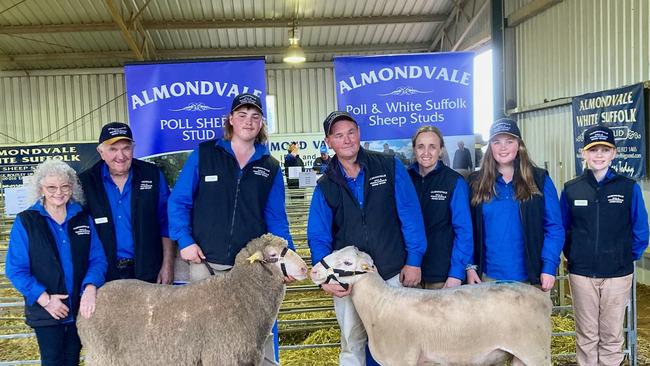
CONNECTED TO THE LAND
The Routley name has been connected with the land at Almondvale since 1911.
Initially, Corriedales were their breed of choice.
This was appropriate at the time because of the dual-purpose nature of the breed, and still fits in with the ethos today.
Corriedale sheep have a long-held significance in the sheep and wool industry.
The Lockhart region, which is close to Urana, is synonymous with the evolution of the Corriedale breed.
After establishing a Corriedale stud at Almondvale, the sheep evolved into the Bond stud. Five years ago they changed the name of the Bond sheep stud to Almondvale Poll sheep stud.
Peter was involved in a Young Farmers project in 1965 and remembers buying 33 ewes and a ram.
In a bid to introduce some terminal blood and diversify, the family later introduced White Suffolks.
The White Suffolk breed had previously proven to be an excellent performing terminal sire in the commercial flock.
The Routley family will host their 20th on-property White Suffolk sale in September. It will be their 36th year of selling Bond rams.
They typically run about 4000 ewes, which encompasses both stud and commercial operations and represents both breeds plus first and second-cross progeny.
“We just finished shearing a couple of weeks ago,” Paul said.
The shearing included a total of 5300.
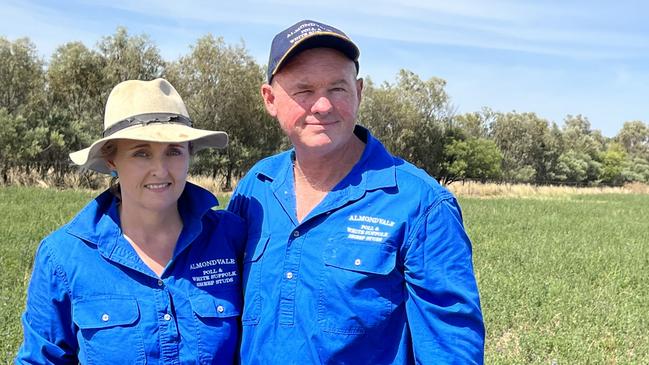
WOOL SECURITY
The Routleys are also heading down the path of twice-yearly or six-month shearing.
They already shear maiden ewes twice a year.
This management technique bodes well for husbandry and also helps with staple length.
However, they are looking at expanding the practice across the flock to include all of the sheep rather than just the maidens.
“The staple length has been getting too long,” Paul said. “But it’s a logistics issue too. We have cropping and harvest to contend with, plus ram sales, and also, there’s the challenge of getting shearers.”
For the Routleys, both wool and meat attributes go hand-in-hand and are equally important.
Paul said the rams, in 1988, averaged 25.4 micron and weighed 78 kilograms.
“Last year (young rams) averaged 100 kilograms and were 20.7 microns,” he said.
Paul and Peter have both focused on other attributes of the wool clip, such as softness, by seeking out genetics that could improve their flock.
“We always concentrate on dual-purpose sheep and never lose sight of that,” Paul said.
Most lambs turned off from Almondvale are sold directly to processors, and the Routleys are keen to learn more about new scanning technology and meat yield.
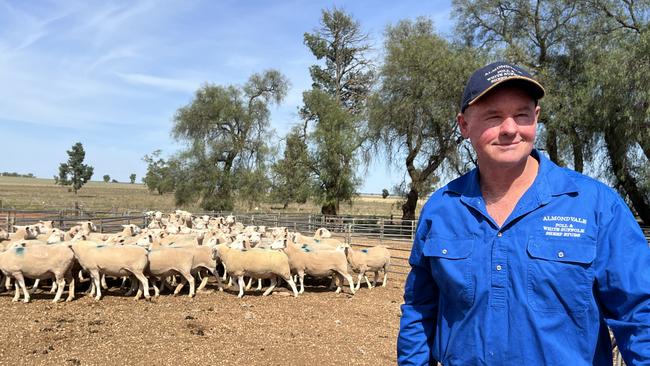
QUALITY IN WET YEAR
The average annual rainfall at Almondvale is 450mm; however, last year, the property received a whopping 1000mm.
Fortuitously, the higher rainfall didn’t affect micron across the flock, as might be expected, and Paul said there were just six fleeces affected adversely in regards to colour.
The variability in rainfall and adaptability of the dual-purpose sheep means the genetics can thrive in wetter areas, such as Gundagai or Tumut, while still giving producers good wool attributes.
To support the sheep operation, grazing crops are an essential part of the farming system.
Paul said they would plant up to 1400 hectares of crop this year, including vetch, oats, feed wheat and feed barley, lupins, plus traditional wheat and barley.
A lot of the crops are undersown with lucerne.
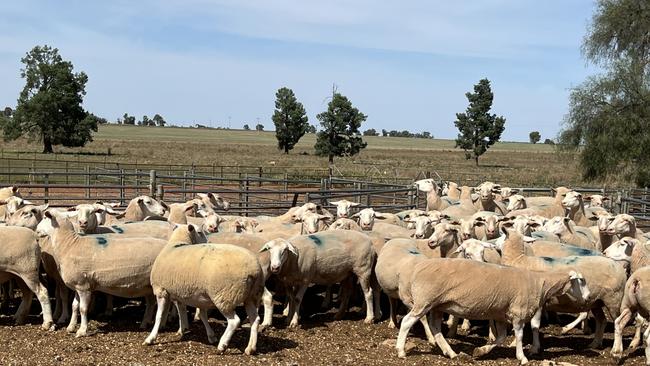
FAMILY TEAM WORK
A drive for continued improvement runs in the Routley family.
The mix of the tried and true visual appraisal passed down from generation to generation is mixed with the latest in innovative scanning and data measurement.
Paul can quote figures. He can articulate improvements. And he also knows where the operation is headed.
A deep respect runs from grandfather to grandchildren, with Peter sharing anecdotes of how imparting knowledge to the children gives a sense of meaning and fulfilment.
Shearing is always an educational experience, from learning about the attributes of a quality fleece to understanding good conformation.
Peter has encouraged the Routley children to learn from others, too. They regularly enter junior judging competitions and participate in agriculture at St Paul’s College, Walla Walla.
Anyone who attends the on-property sales at Almondvale would also understand how involved the next generation is. It’s obligatory to take a day off school and help with the sale, a true family event.
GIVING BACK
Paul is currently the NSW White Suffolk Association president and has held the role since 2006. He is also a national board committee member for Australian White Suffolks.
He is president of Stockscan Australia and on the Elite Show and Sale, Bendigo.
Both Paul and Peter are qualified wool classers.
Paul has judged sheep at Sydney Royal Show three times, the Elite Show and Sale at Bendigo, the Australian Sheep and Wool Show at Bendigo, and the National Merino Sheep Show and Sale at Dubbo.
He has also judged in Launceston, Tasmania and regularly attends the Sheep and Wool Fair at Holbrook.
Peter said the youth events and junior judging were a valuable pathway for the children.
“I want to see them be able to take over here one day,” Peter said.
Paul said he had recently seen lamb chops priced as high as $70 a kilogram.
After recently attending the White Suffolk Conference, delegates learned that American consumers eat about 600g of lamb annually, compared with their protein of choice, beef, at 25kg annually.
Mr Routley said it was essential producers were paid well for lamb, but also it had to be accessible to consumers.
He said lamb was now considered a delicacy, but it needed to compete with other protein sources.
More Coverage
